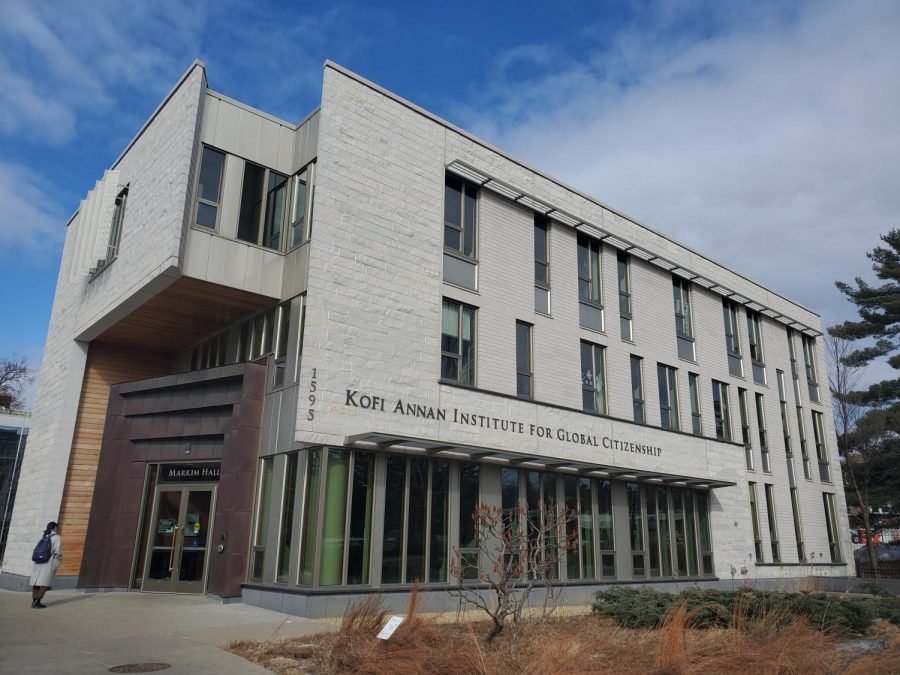In-person classes put our community at risk, but so would a completely online semester
July 8, 2020
On July 6, ICE released a statement declaring that non-immigrant international students who attend colleges and universities that are having an online semester must exit the country. International students now have two options — they may transfer to an in-person institution, or exit the country and readjust their visa status.
For most of us, leaving the U.S. even for a semester would mean we are not allowed to do an internship the following summer, and possibly risk our working opportunities in the United States for up to three years after graduation. For international students in Harvard, Yale or other colleges that decided to go fully online for at least a semester, this is a big problem. Macalester is planning to follow a hybrid model where students may complete the semester online, but can also choose to attend classes in person. Most likely, international students at Macalester, such as myself, will not be significantly affected by this situation. However, we still have a lot of questions to deal with.
There has been heated debate within our community about whether or not the semester should be entirely online. There was even a petition going around, with more than 400 signatures, demanding the administration that the semester be remote, due to public health and safety concerns. I too was one of the signatories of the petition. With the expected second wave in the fall and the rapid increase in cases in the United States, the responsible choice would be to avoid in-person classes, which may easily contribute to the spread of the virus. I still believe that in-person classes are dangerous and will put our community at risk. However, with the recent ICE statement, the situation is now much more complex.
On the one hand, there is a definite danger to our community to have face-to-face classes. On the other, there is now the fact that should classes go online, international students will have to leave the country. Although we would still get credit for our coursework, our internship and work opportunities would virtually disappear, and we would lose our F1 status, which would mean having to apply for a student visa again. As of March 20, U.S. consulates and embassies suspended routine visa appointments for an indefinite period. If international students choose to leave, the exact date we would be able to come back is uncertain.
In light of all this, the petition that called to move classes online was withdrawn. I am content with this move: if approved, this petition would jeopardize the college’s international community. However, my concerns over public health and safety are still lingering. How can we possibly put people in classrooms for a few hours a day and stop the spread of the virus? Of course, it is still unclear how many students will opt to take classes in person, but in any case, there is no completely safe way to put people in indoor spaces for several hours a day. Without the ICE decision, in-person classes would be unacceptable. Yet we cannot disregard the ICE decision. As such, I decided to take my signature off the petition before it was withdrawn altogether. I did not like having to do it, though I do think it was the right decision. We should not have the semester fully online, not if it is going to risk the well-being and the futures of many international students.
That being said, as the petition is withdrawn, what we ought to do now is to push the administration to create classroom environments in the safest way possible. We are in no obligation to use the in-person time to its fullest extent, indeed, we should refrain from doing so. The new ICE guideline will force us to have some in-person components for our semester. As of now, how much time we should spend in classrooms is still a decision for the colleges. Let’s demand our administration to make it very little. Apart from the classes, we should make sure student organizations operate in the safest possible way. This may mean giving up some social activities for the year, or making adjustments so that we avoid having lots of people in indoor spaces. Zoom events are generally rather underwhelming, though they may be the safest option for a while. Besides, we have other ways to organize events: we can maximize the use of outdoor spaces where people can spread out. Next semester is going to look fundamentally different than the previous ones, and we must make sure our college creates a safe environment for our community.
Many colleges and universities across the country are also planning to sue the federal government to overturn this decision. Whether this lawsuit will secure the position of international students before the semester starts is unknown. In any case, Macalester must join this legal fight. As an institution and community that boasts the value of internationalism, we ought to fight this decision fervently














